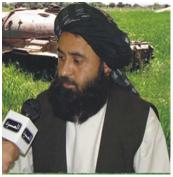|
|
|
Map of Afghanistan showing Taliban control. Kunduz and Baghlan provinces are directly north of Kabul. Data from Afghanistan’s Interior Ministry; map from Reuters. |
The Afghan government claimed that a senior Taliban leader was one of 15 Taliban fighters killed during an operation in the restive north.
Engineer Mohammed Omar, the governor of Kunduz province, claimed that Mullah Abdul Salam, the Taliban’s shadow governor for the province, was killed during an operation that was launched in the Qala-i-Zal district yesterday.
But the Taliban denied that Salam was killed during the fighting. A Taliban leader identifying himself as Salam contacted Pajhwok Afghan News and said that the government’s reports were false and that he would continue to fight Afghan and Coalition forces.
|
|
|
Kunduz shadow governor Mullah Abdul Salam. Image obtained by The Long War Journal from an interview by Al-Sumud, a takfiri magazine from Afghanistan published in Arabic. |
Salam is currently number one on the Coalition’s 10-most-wanted list for Kunduz province. He takes direct orders from the Quetta Shura. Earlier this spring, Salam was thought to have fled to Kandahar after ISAF and Afghan forces launched a series of offensives in the province.
Kunduz has been the hub of Taliban activity in the north as the group seeks to pressure the Afghan government from a region previously thought to be secure. Three districts in Kunduz – Chahara Dara, Dashti Archi, and Iman Sahib – are currently contested between the Taliban, and Afghan and Coalition forces. Two districts in neighboring Baghlan province – Baghlan-i-Jadid and Burka – are under the control of the Taliban [see Threat Matrix report, Afghanistan’s wild-wild North].
A strong Taliban presence in Kunduz also puts the Taliban on the border with the Central Asian nations. Control of Kunduz opens up access to Tajikistan and Uzbekistan to the North. The Islamic Movement of Uzbekistan (IMU), a grouping of al Qaeda-backed Central Asia extremists, is known to operate in Kunduz with the local Taliban. Four IMU fighters were killed in fighting Aug. 28, while as many as 80 al Qaeda-linked militants, including Uzbeks and Chechens, are operating in areas southwest of Kunduz City.
The IMU, under the command of Mullah Abdullah, sent a force of 300 fighters into the town of Tavil-Dara in Tajikistan and attacked a police station on July 9. Abdullah is thought to have crossed from Kunduz into Tajikistan several weeks before the attack. Eleven days later, the IMU attacked a remote military checkpoint in Tajikistan near the Afghan border. Five IMU fighters were killed during the assault.
The Afghan military, backed by US and German troops, have launched multiple operations to clear the Taliban from contested districts in Kunduz since the spring, but with little effect. Several senior Taliban commanders have been killed during the clashes, however.
Fighting in Kunduz is at a peak, and the month of August saw an exceptional number of clashes between Taliban fighters and Afghan and Coalition forces.
The Taliban have conducted assaults against police checkpoints, killed senior political and military leaders, and kidnapped civilians sending their daughters to school.
List of major incidents in Kunduz since Aug. 3
Sept. 3, 2009: Afghan security forces killed 15 Taliban fighters, and claimed the Taliban’s Shadow governor was also killed.
Sept. 1, 2009: Afghan police killed a Taliban commander and wounded his driver in the Qala-i-Zal district.
Aug. 28, 2009: Afghan forces killed seven Taliban fighters and captured four members of the al Qaeda-linked Islamic Movement of Uzbekistan in Kunduz province.
Aug. 26, 2009: A director of the justice department was killed in a bomb attack on his car in Kunduz province.
Aug. 26, 2009: Security forces killed seven Taliban fighters during an operation in the Hazrat-e-Sultan area of Kunduz.
Aug. 25, 2009: The Taliban killed a policeman in Kunduz.
Aug. 18, 2009: A Taliban commander and nine fighters were killed during a joint operation of Afghan and US forces in Kunduz province.
Aug. 16, 2009: One Afghan Army soldier was killed and four more were wounded during a Taliban ambush.
Aug. 13, 2009: Former President Rabbani survived an ambush on his convoy in Kunduz. Also, police killed and wounded more than 20 Taliban fighters after the Taliban attacked a police station.
Aug. 13, 2009: Eight Taliban fighters and two Afghan security personnel were killed and more than a dozen more fighters and four security men were wounded during an operation in Kunduz province.
Aug. 12, 2009: Taliban fighters attacked the Dashti Archi district headquarters and killed the district police chief and three other policemen.
Aug. 10, 2009: A suicide bomber detonated his explosives-filled car close to an ISAF convoy in Kunduz City.
Aug. 3, 2009: The Taliban kidnapped a woman as she took her daughter to a school in the Bagh Shirkat area of Kunduz province. The Taliban warned families not to send their daughters to schools.









5 Comments
North of Hindu Kush Taliban does not have a chance, even language there is not Pashto. Even opium is eradicated in north. South can be secured if Balochistan border with Pak is secured. Baloch is already in good govt. control, they have to secure cities and border roads.
Very nice map from LWJ. Time to secure Kunar that is north of Kabul – Bajaur on Pak side of border is cleared already.
The Thunder Run has linked to this post in the blog post From the Front: 09/04/2009 News and Personal dispatches from the front and the home front.
For reference, since it’s not marked on the map, Kunduz is the province on the northern borner, NNE of Kabul, that’s partly covered in yellow, yes?
The present situation can be from the map at a glance. I agree with Minnor ‘s point of view.
Minnor, someone forgot to tell al-qaida and taliban that they can’t go there.